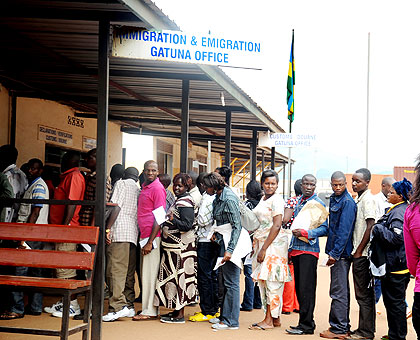2013 has been rosier for the East African Community integration efforts, despite some foot-dragging during the year. With much of the integration agenda often ending on paper, three regional countries, Uganda, Kenya and Rwanda moved to fast-track some projects in a tripartite arrangement. The result saw some interesting projects being rolled off, more etched on paper and leaders making headway across the board.


2013 has been rosier for the East African Community integration efforts, despite some foot-dragging during the year.With much of the integration agenda often ending on paper, three regional countries, Uganda, Kenya and Rwanda moved to fast-track some projects in a tripartite arrangement. The result saw some interesting projects being rolled off, more etched on paper and leaders making headway across the board.Monetary Union ProtocolThe greatest achievement that went into the books in 2013 was the signing of the East African Monetary Union Protocol.The five Heads of State convened in Kampala during their 15th ordinary summit on November 30 and appended their signatures on the protocol.It now paves way for a process that would lead to the adoption of a single currency across the five partner states; Burundi, Kenya, Uganda, Tanzania and Rwanda. The East African Community Monetary Union became the third pillar to be signed by the bloc after the Customs Union, signed in 2005, and the Common Market Protocol that was assented to in 2010.However, both the Customs Union and Common Market protocols are yet to be fully implemented, with authorities saying "it’s work in progress.”The realisation of a single currency, although it would take more 10 years to be established, was seen as an outstanding effort to spur economic development within the community since it would facilitate trade.Kenyan President Uhuru Kenyatta, who assumed chair of the Summit from Uganda’s Yoweri Museveni in November, described the protocol as a new foundation to unlock the integration agendas."We now have the framework required to unlock the promise of integration. In other words, we have a duty as a community to give life to the instruments we establish by rigorously and conscientiously abiding by their provisions,” Kenyatta said."It is time to liberate our people, businesses and capital and allow them to deliver prosperity. That is the true promise of integration.”Trilateral dream-come-trueIn June, Presidents Paul Kagame and Kenyatta were hosted by Museveni in Entebbe where the leaders agreed to go trilateral in fast-tracking some of the regional projects.They resolved to introduce an East African identity card as well as fast-track political integration.Rwanda was given the responsibility to spearhead the establishment of the identity cards, single tourism visa and single customs territory. The single visa would facilitate international tourists to travel the three countries without the need for additional visas, thus enhancing tourism sector potential.Uganda was tasked to spearhead the oil refinery, political federation and railway project, while Kenya would spearhead the oil pipeline and electricity.The countries agreed that, effective today, citizens from the three countries will be using their national identity, and, on a temporary basis, voter and student cards, as travel documents, as well as implementing the single tourist visa.South Sudan joins initiativeIn their October summit in Kigali, South Sudan also came on board and the Heads of State launched the single customs territory to facilitate the free movement of goods from Mombasa port to the landlocked countries.South Sudan President Salva Kiir said his country would waive visa fees for Rwandans to ease free movement of people among the two countries.However, although the leaders were eager to implement the project, other members; Tanzanian and Burundi, looked at the initiative as a conspiracy to sideline them, but the other three said everyone was free to join.New facesThe year also saw former EALA member Jacqueline Muhongayire appointed as the Minister for East African Community Affairs, replacing Monique Mukaruliza, now the national coordinator of EAC tripartite initiative.Amb. William Kayonga, formerly permanent secretary in the EAC ministry, was also moved to head the National Agricultural Export Development Board and replaced by Innocent Safari.
---------------------------------------------------
Challenges in EAC integrationAlthough the integration is on course, some challenges continue to bog it down, especially the will to implement the decisions. Also, the failure to scrap work permit fees among the citizens continues to hinder the free movement of citizens in the community.In April, members of the East African Legislative Assembly passed a motion urging EAC partner states to scrap work permit fees, a move that would facilitate free movement of labour, goods and services within the region. However, despite the significance of the motion, partner state citizens continue to foot the bill.The fees charged to obtain work permits vary between partner states. For example, in Tanzania, a permit costs between $634 and $3,000, while in Uganda, it’s between $250 and $2,500. Burundi charges between $60 and $84 for a regular worker.The issue of trade barriers on central corridor that connects the East African hinterland to the Tanzanian port of Dar es Salaam also continues to daunt free movement of goods despite the northern corridor where transportation is now favourable due to commitment to eliminate trade barriers under the tripartite arrangement.


